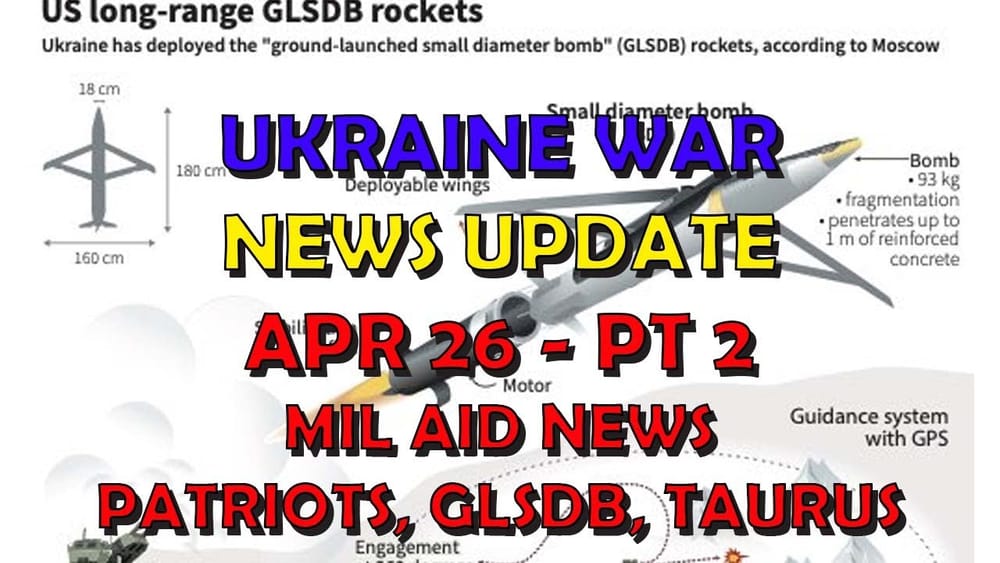Ukraine War Update NEWS: Military Aid News
"He's [Olaf Scholz] got a brain in there and he's making rational decisions."
26/04/2024B
Hello Team
00:00-00:45⏩Jonathan welcomes viewers to part two of the 26th April 2024 Ukraine War News Update, focusing on military aid. He explains he split the news into two parts because of the sheer volume of information regarding military aid for Ukraine. The Ukrainians need an enormous amount of support and many countries are coming together to provide it.
Return to top⤴️
US $6bn USAID package (Patriot missiles, not systems)
00:45-04:10⏩Jonathan discusses a US $6 billion USAID package, initially reported to include Patriot systems, but later clarified to comprise Patriot missiles and other equipment. This aid falls under the Ukraine Security Assistance Initiative, which means contracts are issued to defence firms to manufacture new equipment. This process can take years. Jonathan notes that some suggest this strategy "ring-fences" aid to Ukraine beyond potential political changes in the US after November. Jonathan highlights the urgent need for Patriot systems in Ukraine and expresses disappointment over the delay. He suggests a quicker solution would be using the Presidential Drawdown Authority to deliver existing systems and then replenish US stocks later. He acknowledges Colby Badwai's (conservative commentator) criticism of the Biden administration's handling of the situation.
Return to top⤴️
Greece refuses to provide Patriots and S-300s
04:10-06:38⏩Jonathan reports that Greece has declined to transfer Patriot and S-300 systems to Ukraine, despite earlier speculation about potential S-300 transfers. Greek Prime Minister Mitsotakis, who recently claimed Russia targeted him during a visit to Odessa, says Greece will not part with systems crucial for its own defence against a potential conflict with Turkey. Jonathan notes Greece's consistent 2% GDP spending on defence since 2014 and their historical tensions with Turkey, particularly over Cyprus.
Return to top⤴️
Germany frustrated over lack of European Patriot support
06:38-07:48⏩Jonathan discusses Germany's frustration with other European nations, particularly after Greece refused to participate in their Patriot initiative for Ukraine. Germany, already providing two Patriot systems, pledged another and appealed to other countries to contribute. He notes this follows a pattern of European nations declining to offer Patriot batteries, highlighting the dwindling pool of potential donors. Only the Netherlands has firmly committed to Germany's initiative.
Return to top⤴️
Spain to supply Patriot missiles, not systems, + new arms package
07:48-10:44⏩Jonathan reports that Spain will provide Patriot missiles to Ukraine but not the entire Patriot system, despite pressure from NATO and the EU. Jonathan relays criticism from "Ukraine Battle Map" about Spain's relatively low financial contributions to Ukraine ( $325 million since the war's start) and their failure to meet the 2% NATO defence spending requirement. Jonathan notes Spain's geographical distance from the conflict and lack of historical involvement in Russian conflicts may contribute to their lower engagement. However, he emphasises that Spain, as the EU's fourth-largest economy, benefits from collective EU funding for Ukraine. Jonathan criticises Spain for "free-riding" on the contributions of other nations. He highlights that Spain's defence spending as a share of GDP in 2023 (1.24%) is the third-lowest among NATO members. Jonathan concludes by mentioning Spain is preparing a new arms package for Ukraine to be delivered before June 30th, including 10 Leopard 2A4 tanks (adding to the 10 delivered the previous year).
Return to top⤴️
UK Defence Chief: Ukraine will increase long-range strikes inside Russia
10:44-14:17⏩Jonathan discusses UK Defence Chief Radakin's assessment that Ukraine will escalate long-range strikes within Russia, facilitated by Western aid reshaping the conflict. Jonathan highlights Radakin's crucial role as a key liaison between NATO and Ukraine, frequently visiting Ukraine and engaging in high-level discussions, something US military officials are restricted from doing. Jonathan points out Radakin's open support for Ukrainian strikes and sabotage missions inside Russia, contrasting it with the US's reluctance. Jonathan quotes Radakin who believes such deep operations will become increasingly significant as Ukraine gains more long-range capabilities, stating they "definitely have an effect." He challenges the criticism that the West lacks a coherent plan to help Ukraine secure victory and argues against the notion that the aid provided is merely meant to prevent defeat. Jonathan highlights Radakin's cryptic hints suggesting a greater role for long-distance munitions in the future, enabling Ukraine to "shape the fighting in a much stronger ways than it has before.” Jonathan shares his own perspective, advocating for a strategy primarily focused on long-range strikes against Russia, minimising Ukrainian troop losses. He suggests Ukraine should concentrate on ramping up the production and utilisation of various long-range munitions, including artillery, drones, HIMARS, cruise missiles, and indigenously produced missiles, to maintain pressure on Russian forces and infrastructure.
Return to top⤴️
Scholz and Taurus Missiles: Sophie Dorian's analysis
14:17-22:56⏩Jonathan addresses the debate surrounding Germany's reluctance to supply Taurus missiles to Ukraine, citing former UK Defence Secretary Ben Wallace's call for clearer communication from German Chancellor Olaf Scholz regarding the decision. Jonathan challenges the notion that Scholz’s reluctance is irrational, proposing a more nuanced perspective, drawing upon comments from long-time viewer "Sophie Dorian." Jonathan summarizes Sophie's theory:
- Germany possesses over 600 Taurus missiles, unique in their bunker-busting capabilities, exceeding those of Scalp and Storm Shadow missiles.
- These missiles are crucial for targeting Russian nuclear weapons stored in hardened bunkers.
- They form an integral part of the European continent's nuclear deterrent strategy.
- Germany brought these missiles to operational status a month ago.
- Germany, unlike France and the UK (both declared nuclear states), focuses on conventional anti-nuclear capabilities, exemplified by the Taurus missiles.
- Supplying Ukraine with Taurus missiles risks those weapons falling into Russian hands, allowing them to develop countermeasures.
- This would compromise Germany's ability to target Russian nuclear assets in a potential conflict.
Jonathan acknowledges Sophie's points, noting that the US, lacking a comparable cruise missile, has not pressured Germany to supply Taurus missiles. He finds this theory plausible, especially considering Scholz's calculated decision-making. While acknowledging the possibility of other contributing factors, he emphasizes the need for transparency and clarity from Germany.
Return to top⤴️
US approves long-range strikes in Crimea (but not Russia)
22:56-24:33⏩Jonathan welcomes the UK's stance on Ukraine conducting deep strikes inside Russia. He expresses a wish that the US would adopt a similar stance and criticises Jake Sullivan's (US National Security Advisor) opposing viewpoint. Jonathan reports that the US has authorised Ukraine to strike facilities in Crimea using long-range missiles. This authorisation, however, is unsurprising, as Ukraine had already used such weapons in Crimea. He expresses disappointment that the US did not use this as an opportunity to greenlight the use of these missiles within Russia itself.
Return to top⤴️
GLSDB bombs proving ineffective in Ukraine
24:33-26:08⏩Jonathan discusses a concerning development regarding the Ground-Launched Small Diameter Bombs (GLSDBs), bombs adapted for launch from HIMARS or ground systems, with a range of 150km. He cites John Ritchie's (OSINT analyst) observation that these bombs, designed as a cheaper alternative to HIMARS rockets, have proven largely ineffective in Ukraine. Jonathan refers to Under-Secretary of Defence for Acquisition & Sustainment William LaPlante who, in a discussion with the Center for Strategic and International Studies (CSIS), highlighted several issues plaguing the GLSDBs, including inadequate tactics and Russian GPS jamming. While Jonathan hopes Boeing and Saab, the manufacturers, can modify the bombs to improve their performance, he acknowledges the significant investment already poured into these weapons, expressing concern about wasted resources if they remain ineffective.
Return to top⤴️
Abrams Tanks withdrawn: Drone vulnerability
26:08-27:26⏩Jonathan discusses reports from the Associated Press (AP) that US-supplied Abrams tanks have been pulled back from the front lines in Ukraine due to their vulnerability to Russian drone attacks. The AP reports that this vulnerability stems from a lack of proper integration of the tanks into Ukrainian operations. Jonathan expresses disappointment over the withdrawal, especially considering five out of the 31 Abrams sent to Ukraine have already been destroyed. He questions how the tanks will be utilised effectively given the persistent drone threat and suggests increased numbers and improved tactical integration are necessary for their successful deployment.
Return to top⤴️
Denmark increases Ukraine fund by €590 million, now ranked 2nd on Kiel Tracker
27:26-28:57⏩Jonathan commends Denmark's decision to increase its financial contribution to Ukraine by €590 million for 2024, highlighting their consistent and strong support. He notes that Denmark now ranks second on the Kiel Institute's Ukraine Support Tracker, a testament to their commitment. He acknowledges that the tracker's latest update does not yet include the recently announced US $61 billion aid package due to data compilation timelines. He anticipates the tracker will be updated soon to reflect this significant contribution.
Return to top⤴️
First Belgian F-16s by Summer, US artillery shell production tripled
28:57-30:54⏩Jonathan reports that the first F-16 fighter jets from Belgium are expected to arrive in Ukraine by summer (late autumn), which he considers an impressively fast delivery timeline. He then highlights the US's commitment to triple its production of 155mm artillery shells to 100,000 per month. He emphasizes that while this increase is framed as aid for Ukraine, it also significantly bolsters the US military's own capabilities. He points out that a substantial portion of the US aid package is directed back into the US economy through defence contracts and replenishment of US military stockpiles. This, he argues, results in a win-win situation where Ukraine receives support while the US military undergoes modernization and expansion.
Return to top⤴️
Kiel Tracker Update: French Military Aid
30:54-33:50⏩Jonathan addresses the recent controversy surrounding the reported figures of French military aid to Ukraine. He explains the Kiel Institute, in their latest update, has significantly revised their figures for French military aid upwards. This, he explains, stems from France's previous lack of transparency and reliance on EU funding mechanisms. He notes that France, following the signing of a security agreement with Ukraine, has become more transparent about their military aid contributions. The Kiel Institute, in light of this increased transparency, revised their assessment, but there are still discrepancies. Jonathan cites an example of the difficulty in reconciling the official French aid figure of €2.6 billion with the estimated value of disclosed military equipment transfers. He questions the methodology for valuing military aid across different countries, suggesting potential inconsistencies in accounting for replacement costs, net book value, or original purchase prices, which may lead to misleading comparisons. He calls for greater clarity and consistency in the evaluation of international military aid contributions.
Return to top⤴️
Estonia and Lithuania: Aid and Ukrainian refugees
33:50-37:18⏩Jonathan commends Estonia's delivery of two patrol boats to Ukraine, facilitated in coordination with Denmark. He praises both countries for their continued support in bolstering Ukraine's maritime defence. Jonathan also highlights the contribution of Czech public transport companies that donated 26 trams to bolster Dnipro's transport network. The first seven trams are en route to Ukraine, with the remaining vehicles to follow shortly. Jonathan then shifts focus to Switzerland's pledge of a 5 billion Swiss Franc ($5.5 billion) aid package for Ukraine, intended to be distributed over several years. He emphasizes this is not a lump sum payment, urging viewers to temper their expectations. Jonathan then delves into a developing situation regarding Ukrainian men of military age residing abroad. He notes that while the Ukrainian Ministry of Defence has stated that men residing abroad are not required to return to Ukraine to update their military records, the Ministry of Foreign Affairs seems to be pursuing a contradictory approach.
Return to top⤴️
Russia increases drone use, Upcoming Livestream
37:18-38:03⏩Jonathan reports on claims from Russian media suggesting that the number of Russian drones operating on the front lines has doubled in the past three months. He expresses reservations about the accuracy of these claims. He invites viewers to join him for a livestream discussion with OSINT analyst Daniela later in the day where they will delve further into the topic of drone usage in the conflict.
Return to top⤴️
Wrap up
38:03-38:03⏩Jonathan signs off, thanking viewers and bidding them farewell.
Return to top⤴️



